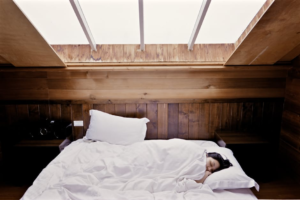The Importance of Proper Sleeping Positions: What You Need to Know
Do you find yourself waking up with unbearable aches and pains? Does your stiff neck or sore back prevent you from feeling rejuvenated and truly rested?
For most of us, sleeping positions aren’t something we give a second thought to since they’re habits that we’ve formed early on in life. While we can’t picture ourselves sleeping in any other ways, studies show that the way we sleep can have a significant impact on our general health.
Why is it important to mind how we sleep?
Assuming each of us spends an average of eight hours of sleep a day, then we dedicate one-third of our lives to sleeping. That is a significant amount of time, and if we spend it all on a single position that isn’t healthful can be detrimental to our well-being.
Awkward sleeping positions can stress our neck and spine, instead of providing our body its needed support. Unideal positions can also put pressure on other parts of our body and cause discomfort and adverse effects in the long run.
Through the years, people have linked poor sleeping positions with neck and back pain, muscle cramps, fatigue, impaired circulation, headaches, sleep apnea, digestion problems, premature wrinkles, and heartburn.
If you or anyone you know is suffering from these health problems, then it might be time to reassess the way you sleep at night, so you can enact the changes you need to get better.
 Assessing the best positions for sleeping
Assessing the best positions for sleeping
When experts determine a person’s best position for sleep, they will consider the support the body receives from the kind of mattresses an individual uses in general. They will also identify if any point in the body experiences excess pressure and if the neck and spine are in proper alignment or not.
Different sleep positions
Supine Position
Many people would agree that sleeping on one’s back is the most optimal position for sleeping. That’s because the head all the way to the spine are in a neutral position, which will lessen pressure on the other areas of the body.
Sleeping in a supine position will help prevent neck and back pain, and reduce acid reflux. It will also minimize chances of having premature wrinkles as well as maintain a person’s breast health. However, this position will likely promote the snoring of an individual.
Prone Position
Sleeping on one’s stomach can help ease the intensity of a person’s snoring. However, it is not the best position to sleep in should you want to take care of your overall health.
When you sleep in a prone position, it is unlikely for you to keep your spine and neck properly aligned. Without the proper support, it is possible for you to have back and neck problems. Also, sleeping on your stomach will put unnecessary pressure on some of your muscles and joints, and will likely disrupt your breathing.
 On Your Side / Fetal Position
On Your Side / Fetal Position
Lying on your side is the most common alternative to the supine position. And by far, most people prefer sleeping on their sides than any other position.
Unlike sleeping on one’s back, side sleeping can help keep a person’s airways open. And so, to an extent, it prevents snoring. However, contracting your body inward will put unnecessary pressure on your diaphragm. And that, in turn, can obstruct your breathing.
Also, side sleeping does not promote the proper alignment of your body’s neck and spine. As a result, it can lead to severe shoulder pain and stiff neck.
So, while side sleeping can reduce snoring and acid reflux, it can also cause shoulder and neck pain, complications in breathing, distortion of breasts, and premature wrinkles, particularly on the side where there is extra pressure.
To avoid the adverse effects one can associate with the fetal position it is best to stretch your body by keeping your legs and neck aligned and relatively straight, instead of pulling them inwards.
Takeaway
If you feel tired or you wake up with your body aching, it might be time to try out a new sleep position. Even small changes like untucking your legs and keeping them aligned with your neck as you sleep on your side can have significant effects on your sleep and health.
And aside from the sleeping position you choose, comfort will also enhance the quality of your sleep. That is why it is also important to have a bed that’s cozy enough to help you have a good night’s sleep.



Leave a Reply
Want to join the discussion?Feel free to contribute!